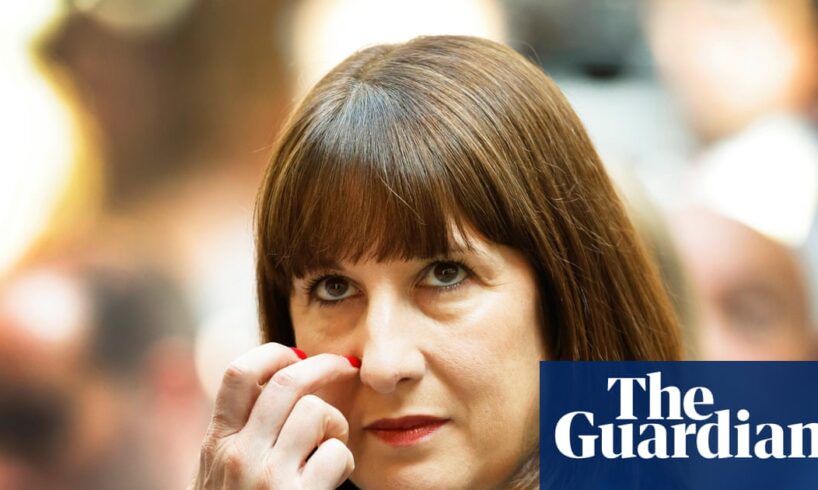
Rachel Reeves was hit by a fresh sell-off in government bond markets on Tuesday, underlining the formidable challenge facing the chancellor in the run-up to the autumn budget.
The yield, or interest rate, on 30-year UK government debt hit its highest level since 1998, at 5.723%, indicating that it will cost the UK more to borrow from the markets.
Yields, which rise when a bond’s price falls, are a measure of the interest rate that investors demand when lending to a government or company.
Rise in government bond yields
The rising yield on long-dated gilts, as UK government bonds are known, echoed a global shift that has pushed up borrowing costs in other major economies, amid fears about erratic US policies.
“These moves are not anything UK-specific,” said Carsten Jung, the associate director for economic policy at the IPPR thinktank. Treasury officials pointed to similar increases in yields on Tuesday in Germany, the US and France.
But with the government already spending more than £100bn a year in interest on the UK’s debts, the latest jump highlighted the extent to which the government feels constrained by the bond markets.
The 10-year gilt yield, which the independent Office for Budget Responsibility (OBR) uses to forecast future government borrowing costs, also rose on Tuesday, hitting its highest level since January.
Meanwhile the pound weakened, falling by more than 1.5 cents against the US dollar to $1.3390, its worst day since early April, when Donald Trump launched his global trade war.
Fall in value of the pound
These latest market jitters followed a shakeup of key figures inside No10, that was widely read at Westminster as an attempt by Keir Starmer to get a firmer grip on economic policy.
This included poaching Reeves’s deputy, Darren Jones, to a new role as Starmer’s “chief secretary” and appointing a heavyweight new economic adviser, former Bank of England deputy governor Minouche Shafik.
Concern that the chancellor is being “managed out” is weighing on UK government bonds, suggested Kathleen Brooks, the research director at XTB.
“The last time there was a threat to Reeves’s position, back in early July, bond yields jumped as the market worried that she could be replaced by a more left-leaning member of the Labour party,” Brooks said.
The chancellor was filmed in tears in the House of Commons chamber in July, briefly prompting bond yields to rise as investors speculated she could be replaced with a more spendthrift alternative.
Brooks confirmed that the UK was “not an outlier” in bond markets for the moment, but added: “As we lead up to the budget, the chancellor’s options are narrowing, and we could see more frequent bursts of bond market volatility. While we are not quite at Liz Truss levels of stress in the UK bond market, the ‘Starmer moment’ for markets could be coming down the line.”
Reeves has argued that her fiscal rules, which some Labour MPs feel unnecessarily limit the government’s scope for action, reflect real-world limits on investors’ appetite for the UK’s debt.
The rules, which apply in five years’ time, require her to balance day-to-day spending with tax receipts and reduce debt as a share of GDP.
skip past newsletter promotion
Sign up to Business Today
Get set for the working day – we’ll point you to all the business news and analysis you need every morning
Privacy Notice: Newsletters may contain information about charities, online ads, and content funded by outside parties. If you do not have an account, we will create a guest account for you on theguardian.com to send you this newsletter. You can complete full registration at any time. For more information about how we use your data see our Privacy Policy. We use Google reCaptcha to protect our website and the Google Privacy Policy and Terms of Service apply.
after newsletter promotion
In a budget now not expected until mid-November at the earliest, the chancellor is widely expected to be forced to raise extra revenue with a fresh round of tax increases, to rebuild the “headroom” against these rules.
City consultancy Capital Economics has predicted that weaker OBR forecasts may mean she has to raise £18-28bn, to leave herself with a buffer of £9.9bn.
A recent flurry of reports about potential budget tax rises have worried bond investors, according to Marcus Jennings, a fixed-income strategist at Schroders.
“Broadly speaking, whilst no specific policy has caused a sell-off in government bonds in isolation, the rush of potential policies is a reminder of how challenged the UK’s fiscal position is. This has likely facilitated a move higher in yields in the UK, notwithstanding the global move in long-end yields,” Jennings said.
The Treasury is keen to damp down some of this speculation. Bank shares fell sharply last Friday after suggestions of a tax on the highly profitable sector. Ministers are also believed to be examining options for taxing property more heavily.
Officials insist that tax changes will be focused on boosting economic efficiency, while Reeves’s central focus will remain improving the UK’s lacklustre productivity.
It is a downgrade of the OBR’s forecasts for future productivity – the amount UK workers can produce in an hour, and a key determinant of economic growth – that is expected to weigh on its budget projections.
The institution’s expectations for productivity are more optimistic than those of many other forecasters, and have repeatedly been disappointed in the recent past.
Any shortfall against Reeves’s fiscal rule appears unlikely to be closed through significant spending cuts, after a backbench rebellion forced Downing Street to abandon plans for £5bn of disability cuts earlier this year.
While bond prices fell on Tuesday, traders piled in to precious metals in a flight to safety. This pushed the gold price up to a new record high of $3,508 (£2,607) an ounce on Tuesday, while silver rose over $40 an ounce for the first time since 2011.
Anxiety over fiscal sustainability is another factor hitting the bond market, with Donald Trump’s recent tax cuts and spending bill expected to add trillions of dollars to the US national debt. Trump’s recent attacks on the independence of the central bank, the Federal Reserve, have also rattled investors.





